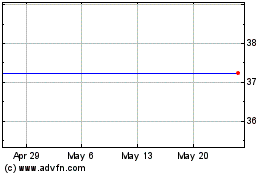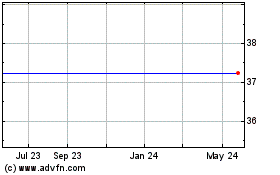UPDATE: EDF Asks Maryland Regulators To Block A Merger
October 12 2011 - 3:37PM
Dow Jones News
French utility Electricite de France SA (EDF.FR) asked Maryland
regulators Wednesday to reject Exelon Corp.'s (EXC) proposed $8
billion buyout of Constellation Energy Group Inc. (CEG) unless
Exelon sells several of its nuclear-power assets and agrees to
other conditions.
Paris-based EDF, which bought half of Constellation's nuclear
power fleet in 2008 for about $4.5 billion, said the merger would
have a "negative impact" on its relationship with Constellation,
and could hurt Maryland consumers "and the state generally,"
according to testimony filed with the Maryland Public Service
Commission.
EDF's main concern is that the merger would give the combined
company control over a generation fleet so large that EDF's joint
venture with Constellation, called Constellation Energy Nuclear
Group, would be prohibited from expanding in the Mid-Atlantic
electricity market "and possibly other markets," according to the
testimony, filed by Jeffrey Johnson, an energy consultant hired by
EDF.
"Like many in Maryland, EDF has serious concerns about the
Exelon-Constellation Energy merger" EDF said in a statement. "We
agree with Governor O'Malley and others opposing the merger that
the transaction is not in the best interests of Maryland."
EDF's objections add to a growing chorus of opposition to the
deal and raise doubts about whether or not the Maryland PSC, which
has the power to scuttle the deal, will allow it to proceed and if
it does, what conditions it may extract, such as cash rebates for
utility customers and the sale of power plants and other
assets.
Gov. Martin O'Malley and other state officials have said they do
not support the merger as proposed.
In September, Maryland's chief energy official, Malcolm Woolf,
said the state didn't support the merger, over concerns that
Baltimore Gas & Electric employees and customers could be at
risk and that the combined company could exercise market power, or
a virtual monopoly, over the region's electricity market.
Economists who have analyzed the merger for the state and for
the region's grid operator, PJM Interconnection LLC, have said the
combined company would have a market position large enough to drive
up wholesale electricity prices. In one analysis, Stanford
University economist Frank Wolak found the Exelon-Constellation
deal could increase wholesale prices by 12% to 37% for parts of the
PJM market such as Philadelphia and Baltimore, in certain
circumstances.
As for EDF, Johnson said the merger would "create a serious
structural conflict of interest" in which Exelon would own almost
one-fifth of U.S. nuclear capacity, allowing the company to
exercise market power. Exelon's partial ownership of CENG's nuclear
fleet would hamstring the joint venture from being able to expand
and could essentially prohibit EDF from expanding in the U.S. power
market, Johnson argued.
Johnson suggested that EDF may have approached Exelon to
collaborate on a new nuclear-power plant at CENG's existing Calvert
Cliffs plant, about 40 miles south of Annapolis, Md.
"Exelon could have made a useful contribution by, for example,
volunteering to join Calvert Cliffs 3 as a U.S. partner to remove
one of the regulatory obstacles to the project," Johnson said.
"Exelon has not done so. When it comes to a project that really
counts for Maryland, Exelon has looked the other way."
An Exelon spokeswoman said the company was still reviewing
Johnson's testimony and was not prepared to comment.
A telephone call to Constellation was not immediately
returned.
In October 2010, EDF and Constellation ended a separate joint
venture, called UniStar, to develop new U.S. nuclear power plants,
after Constellation dropped out of an application for a federal
loan guarantee for Calvert Cliffs 3, the partnership's first
project. At the time, Constellation said high government financing
costs made the company unable to proceed with the project.
Under an agreement, EDF retained the right to continue pursuing
construction of the new reactor and two additional U.S. sites, and
agreed to give Constellation $250 million in cash and stock.
Constellation's departure raised questions about whether EDF would
be able to develop new nuclear projects in the U.S. alone, or
whether it might need a U.S. partner.
Shares of Exelon were recently trading 1.7% higher at $42.83;
shares of Constellation were up 1.8% at $38.24.
-By Cassandra Sweet, Dow Jones Newswires; 415-439-6468;
cassandra.sweet@dowjones.com
--Rebecca Smith contributed to this article.
Constellation Energy (NYSE:CEG)
Historical Stock Chart
From Jun 2024 to Jul 2024

Constellation Energy (NYSE:CEG)
Historical Stock Chart
From Jul 2023 to Jul 2024
